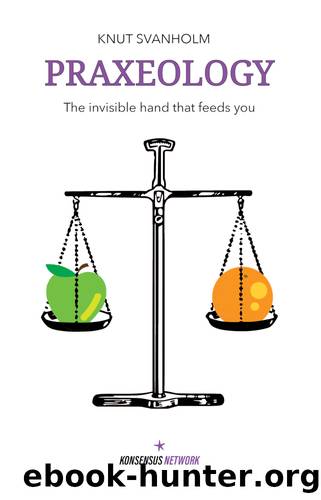Praxeology by Knut Svanholm

Author:Knut Svanholm
Language: eng
Format: epub
ISBN: 9789916723074
Publisher: Konsensus Network
Published: 2023-05-02T14:59:06+00:00
* * *
âHe told me it was men of desperate fortunes on one hand, or of aspiring, superior fortunes on the other, who went abroad upon adventures, to rise by enterprise, and make themselves famous in undertakings of a nature out of the common road.â
â Daniel Defoe, The Life and Adventures of Robinson Crusoe
ENTREPRENEURSHIP
All human action is the conscious aim of an individual to satisfy a particular desire. Always with the ultimate goal of relieving a felt uneasiness. Any desire the person fulfills counts as being of profit to that individual. Any personal desire the actor fails to meet is called a loss. Gains and losses, like all other value judgments, are entirely subjective because they include non-exchangeable goods as well as exchangeable ones. Thus, we can define profit as the satisfaction attained minus the satisfaction forgone. Therefore, all human action seeks profit.
Even suicide is a profit-seeking action. A person engaged in self-murder seeks profit since they value the presumed comfort of death more than the apparent discomfort of life. Even actions directly aimed at helping other people are profitable to the actor. Altruists giving away their wealth to charity are also profit seekers. They hold the warm, fuzzy feeling of being friendly to their fellow humans in higher regard than whatever else they could do with their capital. In this sense, all actions are selfish because they aim to remove or decrease the uneasiness the actor apparently feels. One cannot claim to be âagainst profitsâ without simultaneously being âfor losses.â Praxeology aims at understanding the consequences of various modes of action but never judges the motives behind the action. Science does not adjudicate whether an effort is fair or unfair but rather reveals that all human effort aims toward personal profit. Searching for profit and avoiding losses is, essentially, all we do.
Material profits and losses are different from psychological profits and losses. When people use the terms profit and loss, they typically refer to the material aspect â monetary profit and loss. The success or failure of actions in the market translates into profits and losses that are measurable in monetary terms. In the market, profit means a surplus of money after a set of exchanges, and loss means a shortage. The more profit an entrepreneur enjoys in a completely free market, the better he has satisfied his consumersâ needs.
Since markets are predicated on human behavior, they always contain uncertainty. The better an entrepreneur anticipates how to meet his customersâ wants and needs in the most efficient way possible amidst this uncertainty, the higher his profit will be. Failed predictions lead to losses. An entrepreneurâs profit level tells him how well he satisfied his customersâ desires during the interval he measured that profit. The greater the divide between what customers are willing to pay and the cost of all factors that went into production, the more profitable the venture becomes. Therefore, the entrepreneur always has the incentive to reduce production costs. In doing so, he instills a pricing competition between himself and all other entrepreneurs.
Download
This site does not store any files on its server. We only index and link to content provided by other sites. Please contact the content providers to delete copyright contents if any and email us, we'll remove relevant links or contents immediately.
International Integration of the Brazilian Economy by Elias C. Grivoyannis(110247)
The Radium Girls by Kate Moore(12018)
Turbulence by E. J. Noyes(8040)
Nudge - Improving Decisions about Health, Wealth, and Happiness by Thaler Sunstein(7693)
The Black Swan by Nassim Nicholas Taleb(7109)
Rich Dad Poor Dad by Robert T. Kiyosaki(6612)
Pioneering Portfolio Management by David F. Swensen(6289)
Man-made Catastrophes and Risk Information Concealment by Dmitry Chernov & Didier Sornette(6007)
Zero to One by Peter Thiel(5787)
Secrecy World by Jake Bernstein(4741)
Millionaire: The Philanderer, Gambler, and Duelist Who Invented Modern Finance by Janet Gleeson(4468)
The Age of Surveillance Capitalism by Shoshana Zuboff(4278)
Skin in the Game by Nassim Nicholas Taleb(4239)
The Money Culture by Michael Lewis(4198)
Bullshit Jobs by David Graeber(4179)
Skin in the Game: Hidden Asymmetries in Daily Life by Nassim Nicholas Taleb(3991)
The Dhandho Investor by Mohnish Pabrai(3759)
The Wisdom of Finance by Mihir Desai(3735)
Blockchain Basics by Daniel Drescher(3574)
